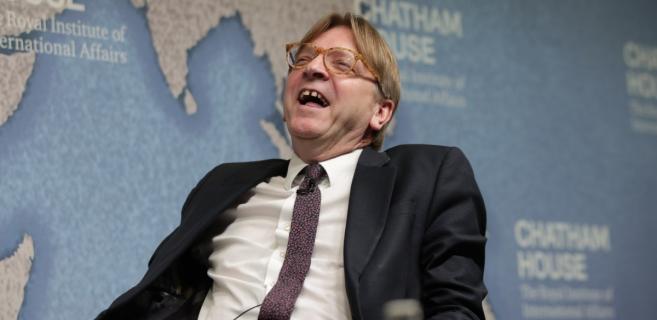The Brexit deal approved on Thursday is the same one the EU proposed to the UK "three years ago," the EU Parliament's Brexit coordinator said on Friday.
"What we have now is the first proposal that we presented to the British three years ago," MEP Guy Verhofstadt said in an interview with Radio 1 after EU and UK leaders announced they had finally agreed on a revised Brexit deal.
"It is the deal that May did not want to accept to avoid upsetting the Northern Irish DUP [party]," Verhofstadt added, referring to a deal former premier Theresa May said "no British prime minister could accept."
The revised agreement, which Prime Minister Boris Johnson must get approved by the UK Parliament on 19 October, would keep Northern Ireland inside the UK’s customs union but subject to some EU checks and rules on goods.
In reference to the current Brexit deadline of 31 October, Verhofstadt told VRT that time constraints could explain Johnson's acceptance of the deal, which led him to cross several red lines, including agreeing to the de-facto customs border on the Irish Sea.
To increase the chances of Brexit happening on Halloween, MPs must approve Jonhons's revised deal on Saturday, in order for it to get voted on by the European Parliament (EP) in time.
Related News
- 'Devil in the details': Belgium reacts to new Brexit agreement
- Brexit deal: Belgian businesses hold their breath for UK Parliament reaction
Verhofstadt, Brexit coordinator in the EP, has said that MEPs will not ratify the deal ahead of their UK counterparts' vote.
"Europe is not going to take any risks by starting the procedure now and then being confronted with a British parliament that does not approve it," he said.
While Johnson has said that he is "very confident" that British MPs will approve his deal, he would need to get the backing of several former Conservative MPs who he removed from the party in September, as the DUP have duly said they do not support the deal.
If the deal is not approved in the UK parliament, Johnson would be obliged to require an extension under a recent law passed in September called the Benn Act.
Verhofstadt said that the EU would only be inclined to accept an extension if there was a "clear" scenario to break the deadlock on the UK side, adding that he believed a no-deal Brexit on 31 October was "less likely," citing Johnson's awareness that it would have "catastrophic" consequences.
Gabriela Galindo
The Brussels Times

